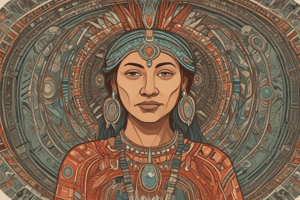Podcast
Questions and Answers
What is a key characteristic of primitive medicine?
What is a key characteristic of primitive medicine?
- Reliance on modern scientific research
- Usage of advanced medical technologies
- Emphasis on balance between physical, spiritual, and emotional well-being (correct)
- Focus on physical health only
Which of the following is a common practice within primitive medicine?
Which of the following is a common practice within primitive medicine?
- Chemotherapy for cancer treatment
- Surgical procedures with anesthesia
- DNA analysis for diagnosis
- Herbal remedies derived from plants (correct)
In primitive medicine, what is the purpose of rituals and ceremonies?
In primitive medicine, what is the purpose of rituals and ceremonies?
- To gather scientific data about diseases
- To analyze the efficacy of modern medicine
- To restore balance and harmony to the body and mind (correct)
- To conduct surgeries with precision
What diagnostic technique is NOT commonly associated with primitive medicine?
What diagnostic technique is NOT commonly associated with primitive medicine?
Which system of medicine emphasizes the use of diet and herbal remedies as part of its practices?
Which system of medicine emphasizes the use of diet and herbal remedies as part of its practices?
What type of practices do shamans typically engage in?
What type of practices do shamans typically engage in?
Which belief system often influences the practices of primitive medicine?
Which belief system often influences the practices of primitive medicine?
What is one of the primary approaches to illness in primitive medical systems?
What is one of the primary approaches to illness in primitive medical systems?
Flashcards are hidden until you start studying
Study Notes
Definition and Scope
- Primitive medicine refers to the medical practices and beliefs of ancient and indigenous cultures, often characterized by a lack of modern scientific understanding and technology.
- These practices often rely on traditional knowledge, spiritual beliefs, and empirical observations.
Common Features
- Holistic approach: primitive medicine often views health as a balance between physical, spiritual, and emotional well-being.
- Use of natural remedies: plants, animals, and minerals are used to treat illnesses and injuries.
- Spiritual and mystical beliefs: many primitive medical practices are influenced by spiritual and mystical beliefs, such as the concept of evil spirits or supernatural forces causing illness.
Examples of Primitive Medicine
- Shamanism: a spiritual practice found in many indigenous cultures, where shamans use rituals, meditation, and natural remedies to diagnose and treat illnesses.
- Ayurveda: an ancient Indian system of medicine that emphasizes diet, herbal remedies, and spiritual practices to maintain health and wellness.
- Traditional Chinese Medicine: a system of medicine that originated in China, based on the concept of balance and harmony in the body, and uses techniques such as acupuncture and herbal remedies.
Diagnostic Techniques
- Observation: practitioners observe symptoms, such as changes in skin color, pulse, and behavior.
- Divination: techniques such as reading omens, interpreting dreams, and using oracles to diagnose illnesses.
- Spiritual rituals: rituals and ceremonies are used to diagnose and treat illnesses, often involving the participation of the community.
Treatment Methods
- Herbal remedies: plants and plant extracts are used to treat various ailments.
- Rituals and ceremonies: spiritual rituals and ceremonies are used to restore balance and harmony to the body and mind.
- Surgical techniques: simple surgical procedures, such as trephining (a form of skull surgery) and bone setting, were used to treat injuries and illnesses.
Limitations and Challenges
- Lack of scientific understanding: primitive medicine often lacks a scientific understanding of human anatomy and physiology.
- Limited treatment options: treatment options are often limited to natural remedies and spiritual practices.
- Variability and inconsistency: primitive medical practices can vary greatly between cultures and regions, leading to inconsistencies in diagnosis and treatment.
Definition and Scope
- Primitive medicine encompasses medical practices from ancient and indigenous cultures with minimal reliance on modern science and technology.
- It is rooted in traditional knowledge, spiritual beliefs, and empirical observations about health and illness.
Common Features
- A holistic approach is central, considering the balance of physical, spiritual, and emotional well-being.
- Natural remedies are prevalent, utilizing resources from plants, animals, and minerals to treat ailments.
- Spiritual and mystical beliefs often influence these practices, attributing illness to evil spirits or supernatural forces.
Examples of Primitive Medicine
- Shamanism: Involves shamans using rituals, meditation, and natural remedies to diagnose and heal illnesses across various indigenous cultures.
- Ayurveda: An ancient Indian medicinal system focusing on diet, herbal remedies, and spirituality to promote health and wellness.
- Traditional Chinese Medicine (TCM): Originating in China, TCM emphasizes body balance and harmony, employing techniques like acupuncture and herbal treatments.
Diagnostic Techniques
- Observation: Practitioners assess symptoms through observable changes, including skin color, pulse, and behavior.
- Divination: Methods such as reading omens or interpreting dreams help in diagnosing health issues.
- Spiritual rituals: Community participation in rituals and ceremonies aids in diagnosing and treating illnesses.
Treatment Methods
- Herbal remedies: Utilizing plants and plant extracts to alleviate various health problems.
- Rituals and ceremonies: Spiritual practices are conducted to restore bodily and mental harmony.
- Surgical techniques: Basic surgical procedures like trephining and bone setting are employed to manage injuries and health conditions.
Limitations and Challenges
- Primitive medicine frequently lacks a scientific basis, leading to deficits in understanding human anatomy and physiology.
- Treatment options are constrained primarily to natural and spiritual remedies, limiting scope.
- Practices may differ significantly across cultures and regions, resulting in variability and inconsistency in both diagnosis and treatment.
Studying That Suits You
Use AI to generate personalized quizzes and flashcards to suit your learning preferences.




